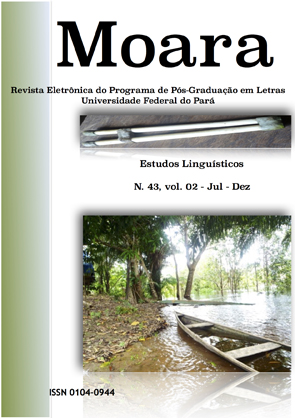Classifiers in Paresi-Haliti (Arawak)
DOI:
https://doi.org/10.18542/moara.v2i43.3838Resumo
ABSTRACT: This work presents the nominal classification system of Paresi. Paresi is an Arawak language, spoken in Mato Grosso (Brazil). The data comes from field work in the Formoso and Rio Verde communities. In Paresi, similar to other Arawak languages, nouns can be inalienable or alienable. Inalienable nouns are bound nouns that can only occur with the possessor prefixes or the non-possessed suffix. There are two types of inalienable nouns: simple inalienable nouns and inalienable nouns with a classifying function. These nouns have their meaning metaphorically extended in order to categorize a nominal referent. Furthermore, they can be part of a compound, be incorporated into a verb, and occur also with numerals and demonstratives. These bound nouns have functions similar to classifiers as described in the main literature on the types of nominal classification systems: Dixon (1986); Payne (1987); Derbyshire e Payne (1990); Grinevald (2000); Aikhenvald (2000); and Grinevald e Seifart (2004).KEY WORDS: Noun classification. Classifiers. Multiple classifiers.Downloads
Publicado
2016-10-21
Edição
Seção
Dossiê A literatura luso-brasileira no contexto global: atravessando fronteiras


